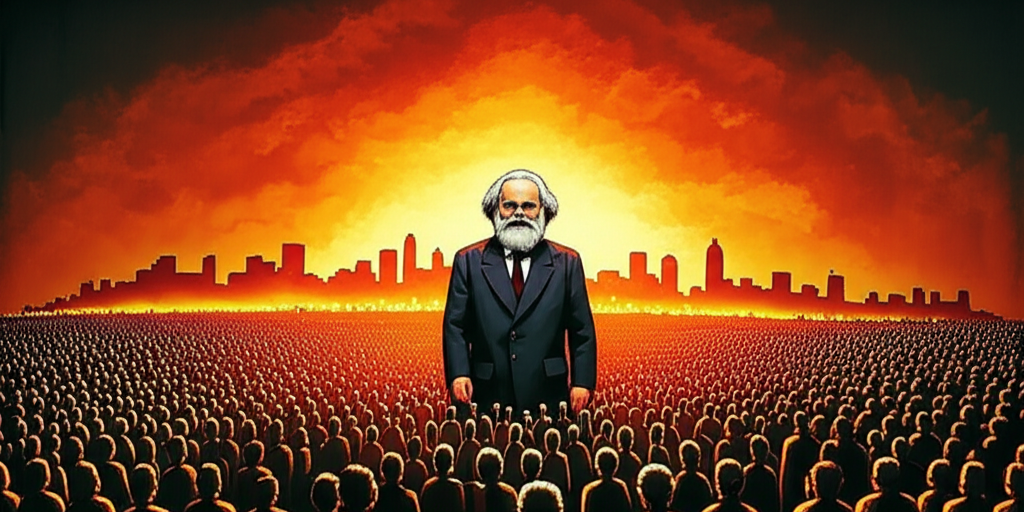Unpacking Marxism: A Guide to Its Core Ideas and Enduring Relevance

Unpacking Marxism: A Guide to Its Core Ideas and Enduring Relevance
Meta Description
Explore Marxism, a socioeconomic analysis developed by Karl Marx and Friedrich Engels, focusing on its core concepts like historical materialism, class struggle, critique of capitalism, and its lasting impact on society and thought.
Introduction
In the vast landscape of social, political, and economic thought, few theories have sparked as much debate, inspired as many movements, and influenced as many academic disciplines as Marxism. Developed primarily by the 19th-century German philosophers Karl Marx and Friedrich Engels, Marxism offers a profound and often provocative lens through which to understand human society, its conflicts, and its potential future. It's a comprehensive framework that examines history, economics, and power dynamics, asserting that these elements are fundamentally shaped by material conditions and the struggle between social classes.
This article will delve into the core tenets of Marxism, demystifying its key concepts such as historical materialism, class struggle, and its incisive critique of capitalism. We'll explore Marx's vision for a communist society and examine the profound legacy and criticisms that have shaped its reception and evolution throughout history.
The Foundations: Historical Materialism
At the heart of Marxist theory lies historical materialism, a method of socioeconomic analysis that interprets historical development through a dialectical materialist lens. This concept posits that the "mode of production"—how a society organizes its economic activity to meet material needs—is the primary driver of its social, political, and intellectual life.
Unlike idealist philosophies that emphasize ideas or consciousness as the primary movers of history, historical materialism argues that the material world and our interactions with it are the source of human consciousness and social relations. As forces of production (like technology) evolve, existing forms of production organization can become obsolete, leading to contradictions that fuel societal change. This isn't just an economic theory; it suggests that all societal institutions, from government and law to culture and ideology, are outgrowths of a society's economic base.
The Engine of History: Class Struggle
A central pillar of Marxism is the concept of class struggle. Marx and Engels famously declared in The Communist Manifesto that "The history of all hitherto existing society is the history of class struggles." They argued that society is fundamentally divided into distinct social classes, whose conflicting interests drive historical change.
In capitalist societies, Marx identified two primary antagonistic classes:
- The Bourgeoisie: This is the ruling class, comprised of those who own the means of production—factories, businesses, land, and capital. They generate profit by purchasing and exploiting the labor power of others.
- The Proletariat: This is the working class, who own no means of production and must sell their labor power to the bourgeoisie to survive.
Marxists believe that the bourgeoisie systematically exploits the proletariat by extracting "surplus value"—the difference between the value workers create and the wages they receive. This inherent exploitation, according to Marx, leads to inevitable class conflict and serves as the central driving force of historical change.
A Scathing Critique: Capitalism, Alienation, and Exploitation
Marxism offers a profound critique of capitalism, highlighting what it views as inherent flaws that lead to inequality and social injustice. Beyond the direct economic exploitation, Marx focused on the concept of alienation.
Alienation, or Entfremdung, describes the profound disconnection workers experience under capitalism. Marx identified four dimensions of alienation:
- Alienation from the product of labor: Workers create products but do not own them; the products become alien objects that dominate and enslave them.
- Alienation from the process of labor: Workers have little to no control over their productive activities, performing repetitive tasks dictated by management and production schedules.
- Alienation from their species-being (human nature): Capitalism reduces human labor to a mere means of survival, disconnecting individuals from their creative potential and unique human essence.
- Alienation from other human beings: The competitive nature of capitalism fosters individualism and competition among workers, hindering cooperation and fostering social estrangement.
For Marx, alienation is an inescapable consequence of capitalism, as workers are separated from the fruits of their labor, the process of their work, their inherent human creativity, and their fellow human beings. This, coupled with the exploitation inherent in the wage system, makes capitalism an inherently flawed system that Marx believed would inevitably lead to a proletarian revolution.
The Vision: Socialism and Communism
Marx theorized that the internal contradictions of capitalism, fueled by escalating class conflict, would inevitably lead to a proletarian revolution. This revolution would overthrow the capitalist system and lead to the establishment of a socialist mode of production.
Socialism, in Marxist thought, is a transitional stage where the means of production are owned and controlled collectively by society, rather than by private individuals. This is seen as a necessary step towards a final, classless, and stateless society: communism.
Marx's vision of a communist society is notably less detailed than his critique of capitalism. However, he envisioned a society where divisions of class, race, and nationality would disappear, and the principle "From each according to his ability, to each according to his needs" would guide the distribution of goods and services. In true communism, alienation would be overcome, and there would be no need for a coercive state or traditional law. The material conditions of production would be the cooperative property of workers as a whole, replacing capitalist property with a higher, communal form.
The Enduring Legacy and Criticisms of Marxism
The ideas of Karl Marx have had an immense and complex legacy. They have inspired numerous revolutions, social movements, and political parties globally, shaping academic disciplines from sociology to literary criticism. Concepts like alienation, exploitation, and class struggle have become integral to social sciences and humanities.
However, Marxism has also faced significant criticism:
- Lack of Revolution in Developed Capitalist Nations: One of the biggest criticisms is that the widespread worker revolution Marx predicted for advanced capitalist countries has largely not occurred. Many capitalist societies have seen improvements in working conditions and social reforms that Marx did not foresee.
- Oversimplification of Class: Critics argue that society is far more complex than a simple binary division between the bourgeoisie and proletariat. The rise of a large middle class and other social categories (like race, gender, and religion) are often seen as inadequately addressed by traditional Marxist theory.
- Economic Determinism: Some argue that historical materialism can be overly simplistic, suggesting that economic factors are the sole cause of societal change, potentially overlooking the role of ideas, culture, and individual agency.
- Failure of Communist States: The practical implementation of Marxist-inspired communism in the 20th century, particularly in the Soviet Union and other communist states, is frequently cited as a major criticism. These regimes often resulted in authoritarianism, economic inefficiencies, and a lack of individual liberties, which critics argue contradict Marx's original vision of a classless, stateless society.
Despite these criticisms and the collapse of many self-proclaimed Marxist states, Marx's critique of capitalism's inherent inequalities, its tendency towards crisis, and its impact on human labor remains relevant in contemporary discussions about wealth disparity, labor rights, and global economic justice. Marxism continues to be a powerful analytical tool for understanding power structures and social change.

